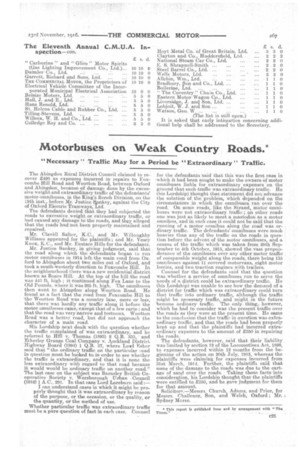Motorbuses on Weak Country Roads.*
Page 5

If you've noticed an error in this article please click here to report it so we can fix it.
" Necessary " Traffic May for a Period be " Extraordinary" Traffic.
The Abingdon Rural District Council claimed to recover £499 as expenses incurred in repairs to Foxcombo Hill Road and Wootton Road, between Oxford and Abingdon, because of damage done by the excessive weight and extraordinary traffic of the defendants' motor-omnibuses, in the King's Bench Division, oil the 15th inst., before Mr. Justice Sankey, against the City of Oxford Electric Tramways, Ltd.
The defendants denied that they had subjected the roads to excessive weight or extraordinary traffic, or had caused any damage to the roads and they alleged that the roads had not been property maintained and repaired.
Mr. Clavell Salter, K.C., and Mr. Willoughby Williams appeared for the plaintiffs ; and Mr. Vesey Knox, K. C., and Mr. Eustace Hills for the defendants.
Mr. Justice Sankey, in giving judgment, said that the road along which the defendants began to run motor omnibuses in 1914 left the main road from Oxford to Abingdon about two miles out of Oxford, and took a south-westerly direction to Foxcombe Hill. In the neighbourhood there was a new residential district known as Boars Hill. At the top of the hill the road was 443 ft. high ; it rontinued along Fox Lane to the Old Pounds, where it was 265 ft. high. The omnibuses then Went to Abingdon along Wootton Road.He found as a fact that the road from Foxcombe Hill to the Wootton Road was a country lane, more or less, that there' was hardly any traffic along it before the motor omnibuses came,•except that of a few carts ; and that the mad was very narrow and tortuous. Wootton Road was a better road, but did not approach the character of a main road.
His Lordship next dealt with the question whether the traffic complained of wa-s extraordinary, and he referred to Hill v. Thomas (1893) 2 Q.B. 333, ' and Etherley Grange Coal Company v. Auckland District Highway Board (1894) 1 Q.B. 37, where Load Esher said that "the ordinary traffic on the particular ;cad in question must be looked thin order to see whether the traffic is extraordinary, and that it is none the less extraordinary with regard to that road because it would would be ordinary traffic on another road." The last case on the subject was Barnsley British Cooperative Society v. Worsborough Urban Council (1916) 1 A. C., 291. In that case Lord Lorehurn said:—
I can understand cases in which it might be pro perly thought that it was extraordinary by reason of the purpose, or the occasion, or the quality, or the quantity, or the method of use.
Whether particular traffic was extraordinary traffic must be a pure question of fact in each case. Counsel for the defendants said that this was the first case in 'which it had been sought to make the owners of motor omnibuses liable for extraordinary expenses on the ground that such traffic was extraordinary traffic. He (his Lordship) thought that statement did not advance the solution of the problem, which depended on the circumstances in which the omnibUses ran over the road. On sonic roads, like the Strand, Motor omnibuses were not extraordinary traffic ; on other roads one was just as likely to meet a mastodon as a motor omnibus, and in such ease it could not be said that the running of a motor omnibus alcing the road. was ordinary traffic. The defendants' omnibuses were much heavier than any of the traffic on the roads in question before the advent of the motor omnibuses, and a census of the traffic which was taken from 28th September to 4th October, 1915, showed the vast preponderance of the omnibuses over any other motor traffic of comparable Weight along the roads, there being 135 omnibuses against 11 covered inotorvans, eight motor lorries, and two traction engines with trailers. Counsel for the defendants said that the question was whether a service of omnibuses run to serve the needs of a district could be extraordinary traffic. He (his Lordship) was unable to see how the demand. of a district for traffic which was extraordinary could turn that traffic into ordinary traffic, although the traffic might be necessary traffic, and might in the future become ordinary traffic. The only. thing,.. however, which be had to consider was the present traffic over the roads as they were at the present time. He came to the conclusion that the traffic in question was extraordinary traffic, and that the roads had been properly kept up and that the plaintiffs had incurred extraordinary expenses to the amountof £350 in repairing the roads:.
The defendants, however, said that their liability. was limited by section 12 of the Locomotives Act, 1898, to expenses incurred within 12 months from the beginning of the action on 20th Slily, ,t915, whereas' the plaintiffs were claiming for expenses incurred from 31st March, 1914. Further, the plaintiffs said that some of the damage. to the roads was due to the cartage of sand over the roads. Taking those facts into consideration, his Lordship thought that. the plaintiffs were entited to £350, and he gave judgment for them for that amount. Solicitors.—Messrs. Church, Adams, and-Prior, for Messrs. Challenor, Son, and Welch, Oxford ; Mr. Sydney Morse. .
























